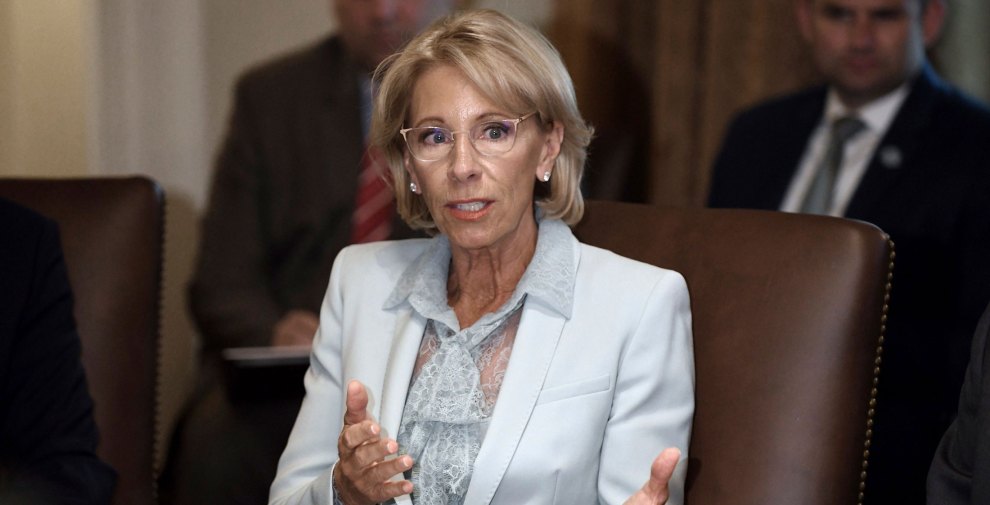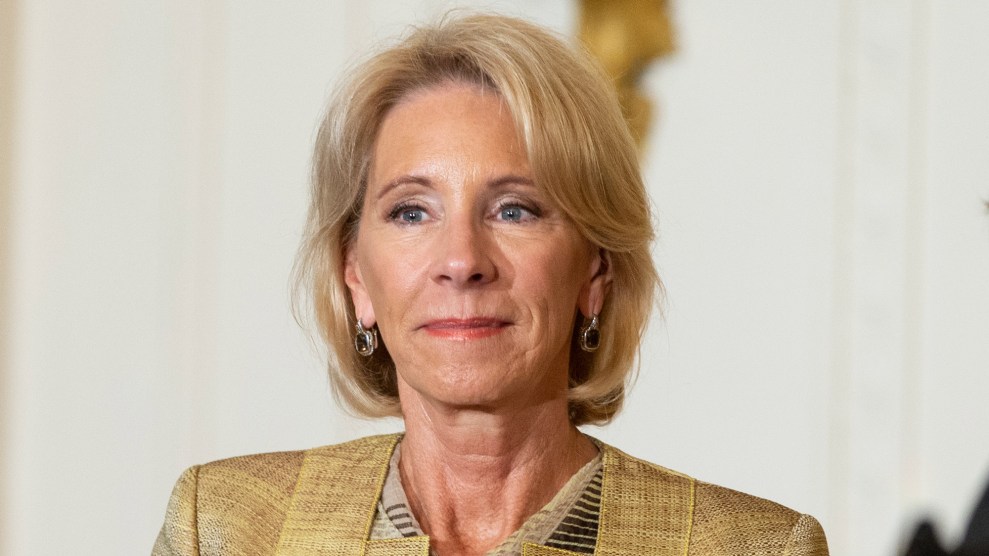
United States Secretary of Education Betsy DeVos speaks during a cabinet meeting in the Cabinet Room of the White House in July.Olivier Douliery/picture-alliance/dpa/AP Images
Under the Obama administration, the Education Department made it a top priority to curtail predatory practices by for-profit colleges. It investigated and sanctioned schools accused of fraud, made it easier for their students to seek debt relief, and threatened to withhold funding from for-profits whose graduates consistently failed to find jobs in their fields. But Betsy DeVos’ Education Department has reversed course in the past few weeks, sharply moving to undo Obama-era protections and effectively leaving students more vulnerable than ever before.
Two planned Education Department changes would make it more difficult for defrauded students to have their loans forgiven and, according to the New York Times and Wall Street Journal, reduce protections for current students. And last week, the department signaled that still other Obama-era higher-education measures could be at risk, leaving consumer advocates worried that students could become even more susceptible to fraud and predation. “These new regulations are really a giveaway to predatory for-profit colleges, especially the large chains, that have defrauded students at the behest of individual borrowers,” says Aaron Ament, president of the National Student Legal Defense Network and former Education Department official during the Obama administration.
Here are the ways the department has recently overhauled protections for student borrowers and empowered for-profit colleges to act with impunity:
Eliminating debt relief rules
Under a proposal unveiled recently, students who left failing or shuttered schools with worthless degrees and steep debt will now likely have a harder time convincing the Education Department their loan debts should be forgiven.
After the collapse of Corinthian Colleges in 2015, the Obama administration received a deluge of claims for debt relief under what’s known as the “borrower defense to repayment” statute. To deal with the onslaught of new claims from for-profit students, the Obama administration proposed giving students a clearer path to file for debt relief claims if their schools violated state laws by engaging in deceptive practices. The department even allowed groups of students who attended certain for-profit institutions to get their loans forgiven.
But DeVos’ change raises the bar for filing a claim: In order to earn loan forgiveness, a student has to either prove a school intentionally defrauded her or go into default before even filing a claim to seek forgiveness. What’s more, the proposal eliminates a ban on mandatory arbitration clauses, meaning students may no longer be able to bring claims against an institution in court. Democratic lawmakers and watchdog groups have expressed concern about the influence of Education Department adviser Robert Eitel, who previously served as a vice president at the for-profit college operator Bridgepoint Education and was reportedly involved in distributing talking points about the rule change.
Proving a school’s intentions, especially outside of court, would be incredibly challenging for defrauded students. Under the Obama administration, they could simply show that a school had made misleading statements and misrepresented its job placement or graduation rates. Now, Ament says, students would have to meet an “insurmountable” standard—without the power to obtain internal records through litigation. “How would a student have access to internal emails between executives?” Ament asks. “In nearly all the cases that we’ve seen that the department’s granted, it’s rare that the student has been able to access that sort of evidence.”
The other route to making a debt relief claim—falling into default—is also a horrible option that could ruin students’ credit if the debt isn’t ultimately forgiven. It is “clearly a way to limit the scope of borrowers who are eligible and make sure fewer people are able to get relief on their loan,” says Clare McCann, deputy director of federal higher education policy with New America and former senior policy adviser for the Education Department under Obama.
Compounding these problems, McCann notes, is that the new rule would also take away group filings for loan forgiveness, like the successful one made by American Career Institute students in January 2017, and instead require students to file claims individually, which can be more burdensome and takes away the prospect of group relief that simplified the process. “All these things together add up to a rule that is shifting the liability for bad actions from bad actor schools to students,” McCann says. “It seems to be about letting schools off the hook for their actions and leaving students to shoulder the debt.”
The tens of thousands of students with existing claims won’t be affected by the new rules, which are expected to go into effect next year. The Century Foundation, a Washington-based think tank, found in May that more than 127,000 debt relief claims were filed to the Education Department by March 2018, up 29 percent from August 2017. Under the Obama administration, the department doled out hundreds of millions of dollars in loan forgiveness claims to students who attended predatory institutions that had shut down. More than 98 percent of those claims came from students who attended for-profit colleges.
Ending the requirement of gainful employment
Though no plans have officially been announced, the New York Times and Wall Street Journal reported on July 26 that Education Department officials plan to eliminate the so-called gainful employment rule, a 2016 safeguard that effectively threatened to withhold federal funds from all colleges that failed to prove their graduates can get jobs and pay off their student debt. In the past, for-profit graduates struggled to find jobs in their fields because their degree wasn’t recognized by regional accreditors; some even found it difficult to transfer credits to get a degree at a different school. All the while, they were required to pay off the loans they took out to earn those worthless degrees.
But the gainful employment rule never actually got off the ground: In July 2017, DeVos announced that its implementation would be delayed for two years. Now it seems like officials will just remove it instead.
James Kvaal, president of the Institute for College Access and Success, a nonprofit college affordability research group, tells Mother Jones he was concerned that eliminating the rule would mean current students would have “substantially weaker protections against fraud or other illegal activity conducted by their college.” Kvaal, who originally helped craft the gainful employment regulations, added that a number of for-profit colleges had already altered their programs to comply, but any progress will now be lost.
Prospective students may never know just how schools are faring on post-graduate employment. Last January, the Education Department released data showing that more than 800 programs—98 percent of which were for-profit colleges—failed the agency’s standards under the gainful employment rule. The Obama-era rule stated if the programs failed twice in three years, the federal government could withhold financial aid and Pell grant funding, putting critical dollars at risk. (For-profits get up to 90 percent of their revenue from federal funds.) In June, the Trump administration, which had already weakened other disclosure requirements, indicated in a filing it would not require institutions to publish its graduate employment statistics until next year.
Gutting the unit that investigated fraud
In May, the Times reported that the Education Department had defanged a key internal enforcement unit that worked with state and other federal agencies to investigate deceptive practices at public and private colleges and universities. The unit was formed in February 2016, after state and federal investigations into accusations of fraud led to the closures of two of the country’s most recognized for-profit college operators, Corinthian Colleges and ITT Technical Institute. In one notable case, the unit worked with the Federal Trade Commission to investigate DeVry University for promoting false job placement claims in ads and recruiting, resulting in a settlement in October 2016.
But under DeVos, members of the unit have been reassigned. Once a dozen strong, the unit has reportedly dwindled to three staffers who have multiple responsibilities, including processing loan forgiveness applications. Education Department spokeswoman Elizabeth Hill blamed the diminishing staff on attrition and told the Times that the change in responsibilities “neither points to a curtailment of our school oversight efforts nor indicates a conscious effort to ignore ‘large-scale’ investigations.”
Even still, the Times reports that in the Trump era, the gutting of the enforcement team “effectively killed” several fraud investigations into for-profit institutions, including into Bridgepoint Education and a separate inquiry into DeVry early last year. Hill told the Times that “conducting investigations is but one way the investigations team contributes to the department’s broad effort to provide oversight.” Afterward, Julian Schmoke, who served as dean of DeVry, joined the department to oversee the enforcement unit. The department told the Times Schmoke had recused himself from issues involving his former employer.
Ament told Mother Jones in May that a number of schools had already voluntarily changed their practices under pressure from the enforcement unit and state partners, including several for-profit colleges that stated that they would stop making students sign mandatory arbitration clauses and would limit how much revenue they received from federal student aid. This progress could be reversed.
Replacing full debt relief with partial forgiveness
Faced with a steep backlog of Corinthian College students unable to pay back their loans, the Education Department decided last December to try to make a “fair and efficient process” for filing for debt forgiveness.
But instead of fully forgiving debts, as the Obama administration had done, DeVos’ Education Department decided it would instead partially forgive students’ debts through a convoluted process that considered how much graduates made, on average, compared to peers in similar job programs. If a Corinthian nursing graduate, for instance, earned less than 50 percent of what her peers made, on average, then she could get their loans fully canceled. Otherwise, there would be a tiered system for determining how much the department would forgive.
So in March, Harvard Law School’s Project on Predatory Student Lending and the legal-service group Housing and Economic Rights Advocates filed an injunction in federal court on behalf of former Corinthian students to stop the department’s partial-relief plan. The plaintiffs claimed that the department wrongfully exploited students’ privacy rights by disclosing and using data for reasons beyond assessing career programs and argued that failing to wipe out Corinthian students’ debt completely was illegal, since the students are entitled to fully canceled debt under the borrower defense rule. In June, a federal judge in San Francisco ruled that DeVos’ department violated federal law by improperly sharing privacy data with the Social Security Administration and ordered the agency to stop collecting the students’ debts.
Under the new proposed borrower defense rule introduced last week, the Education Department could grant partial relief “based on the degree of harm suffered by the borrower,” though it does not make clear how it would determine that calculation. The department has since appealed the judge’s ruling.


















